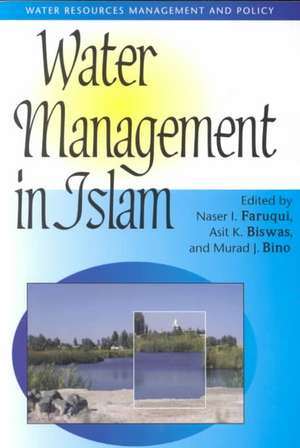Water Management in Islam
Editat de Naser I. Faruqui, Asit K. Biswas Autor Marad J. Binoen Limba Engleză Paperback – 2001
In the Middle East and North Africa, water is rapidly becoming the key development issue. The region has one of the highest population growth rates in the world and scarce natural water supplies. In this region and others, policy makers have often proposed or even tried to implement policies such as higher water tariffs or privatization without considering local culture, including religion; which clearly influences how people perceive and manage a resource, such as water. In addition to supporting large minorities following various faiths, the region is home to 300 million Muslims. Therefore, developing an understanding of the Islamic perspective on proposed water management polices is a key for sustainable and equitable development for Muslim countries in the Middle East and North Africa, and elsewhere. This volume presents Islamic perspectives on a number of proposed water-management policies, including water demand management, wastewater re-use, and higher tariffs. The book opens avenues for wider dialogue amongst researchers working at identifying the most promising water management policies; adds to our knowledge of some of the influences on formal policy and informal practice; and makes these ideals available to a broader public. It serves as a concrete example of the benefit of examining development in the context of values and culture. It also dispels common misconceptions about the Islamic view on water management practices such as selling water and wastewater reuse. Water Management in Islam will interest researchers, scholars, and students in natural resource management, Islamic studies, Middle Eastern studies, development studies, and public policy. It will also be of interest to professionals, including policy makers in donor organizations, development organizations, NGOs and government departments; and agencies, both North and South, working in the area of water management.
Preț: 162.65 lei
Nou
Puncte Express: 244
Preț estimativ în valută:
31.12€ • 32.58$ • 25.90£
31.12€ • 32.58$ • 25.90£
Comandă specială
Livrare economică 10-24 martie
Doresc să fiu notificat când acest titlu va fi disponibil:
Se trimite...
Preluare comenzi: 021 569.72.76
Specificații
ISBN-13: 9789280810363
ISBN-10: 9280810367
Pagini: 176
Dimensiuni: 152 x 229 x 9 mm
Greutate: 0.26 kg
Editura: Brookings Institution Press
Colecția United Nations University Press
Locul publicării:United States
ISBN-10: 9280810367
Pagini: 176
Dimensiuni: 152 x 229 x 9 mm
Greutate: 0.26 kg
Editura: Brookings Institution Press
Colecția United Nations University Press
Locul publicării:United States
Notă biografică
Naser I. Faruqui is a Senior Programme Specialist with the International Development Research Centre, Ottowa, Canada, and focuses on water management in the Middle East. He was selected by the International Water Resources Association (IWRA) as one of 14 water leaders of the next generation, world-wide. Asit K. Biswas is the president of the Third World Centre for Water Management and a member of the World Commission on Water. Murad J. Bino is the Executive Director of the Inter-Islamic Network on Water Resources Development and Management (INWRDAM), Amman, Jordan. He was previously Director of the Environment Research Centre at the Royal Scientific Society, Amman, Jordan.
Descriere
In the Middle East and North Africa, water is rapidly becoming the key development issue. The region has one of the highest population growth rates in the world and scarce natural water supplies. In this region and others, policy makers have often proposed or even tried to implement policies such as higher water tariffs or privatization without considering local culture, including religion; which clearly influences how people perceive and manage a resource, such as water. In addition to supporting large minorities following various faiths, the region is home to 300 million Muslims. Therefore, developing an understanding of the Islamic perspective on proposed water management polices is a key for sustainable and equitable development for Muslim countries in the Middle East and North Africa, and elsewhere. This volume presents Islamic perspectives on a number of proposed water-management policies, including water demand management, wastewater re-use, and higher tariffs. The book opens avenues for wider dialogue amongst researchers working at identifying the most promising water management policies; adds to our knowledge of some of the influences on formal policy and informal practice; and makes these ideals available to a broader public. It serves as a concrete example of the benefit of examining development in the context of values and culture. It also dispels common misconceptions about the Islamic view on water management practices such as selling water and wastewater reuse. Water Management in Islam will interest researchers, scholars, and students in natural resource management, Islamic studies, Middle Eastern studies, development studies, and public policy. It will also be of interest to professionals, including policy makers in donor organizations, development organizations, NGOs and government departments; and agencies, both North and South, working in the area of water management.
